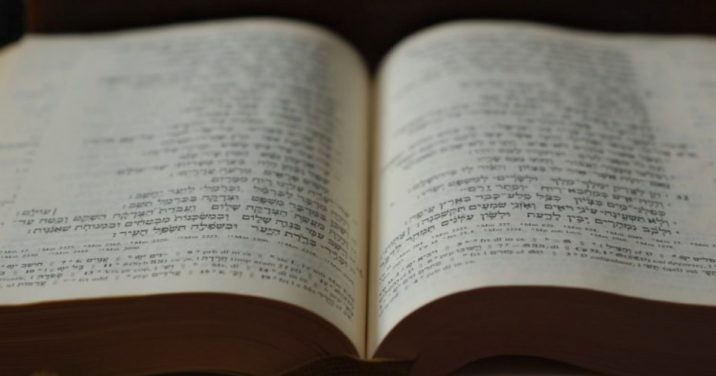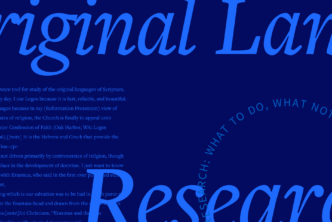Hebrew lexicons are basically dictionaries for the study of individual words in ancient biblical Hebrew. They are essential tools for scholars, pastors, and students studying biblical Hebrew to help decipher Hebrew text not discernable without a lexicon.
- What are Hebrew lexicons?
- Why are Hebrew lexicons important for biblical studies?
- Where can I read Hebrew lexicons?
- What additional resources are available for studying Hebrew lexicons?
What are Hebrew lexicons?
The meaning of individual words must first be determined to understand the meaning of Scripture in the original languages of Hebrew, Aramaic, and Greek. Lexicons provide this invaluable service to the student of the Old Testament. In a typical Hebrew lexicon, every word in the Hebrew Bible has an entry that includes a basic meaning, or gloss, in English (or another target language, such as German) along with examples of that word used in various passages for different glosses.
Hebrew lexicons usually provide the lemma, or root form, of every word. Due to the inflected nature of written Hebrew, not every instance of Hebrew word forms can be included in a lexicon—at least not physical printed copies since they would require too many volumes to be logistically feasible, apart from an analytic lexicon. Instead, Hebrew lexicons provide the three-letter lemma form, with exceptions for words containing fewer letters (such as vav) or the individual letters of Hebrew themselves, which also signify numbers.
Why are Hebrew lexicons important for biblical studies?
Hebrew lexicons are a fundamental part of any exegete’s toolkit. To understand a text in the original Hebrew, a lexicon must be consulted to (1) understand the basic meaning of any word; (2) identify where else in the Hebrew Bible a particular word is used, for the sake of grasping the unique usage of a word in any context; and (3) comprehend the grammatical relationships between words in any context due to particular form of a word being used.
Which Hebrew lexicons should I use?
Brown-Driver-Briggs (BDB) was the leading Hebrew lexicon of the previous generation that has now been superceded. The lexicon is still used in most seminary and undergraduate Hebrew programs due to its accessibility.
Hebrew Aramaic Lexicon of the Old Testament (HALOT) is the standard lexicon for the study of the Hebrew Bible.
Clines’s Dictionary of Classical Hebrew (DCH) is a fitting if not necessary complement to HALOT, since DCH covers both the Old Testament writings and those in the period up to AD 200, including the Dead Sea Scrolls, Ben Sira, and the Hebrew inscriptions.
For further lexical information, consult the Theological Lexicon of the Old Testament. This resource goes beyond simple word-for-word translations and into larger concepts behind the words. The number of entries is smaller than in larger analytical lexicons since the focus is on words with potential theological weight.
What additional resources are available for using Hebrew lexicons?
Lexicons
Hebrew Aramaic Lexicon of the Old Testament (HALOT) is the standard English-language Hebrew lexicon for students and scholars alike.
Brown-Driver-Briggs (BDB) was the foremost Hebrew lexicon of the previous generation and has now been replaced by HALOT and DCH. However, it is still worth consulting in serious exegetical work.
Dictionary of Classical Hebrew(DCH) is the most significant recent Hebrew lexicon to enter the market and should be consulted alongside HALOT in all study of the Hebrew Bible.
The Lexham Analytical Lexicon of the Hebrew Bible contains an entry for every single word in the Lexham Hebrew Bible, including lexical and semantic data.
Brill’s A Concise Lexicon of Late Biblical Hebrew is unique in that it contains only eighty entries that highlight contrasts between classical, late biblical, and rabbinic Hebrew, as well as Aramaic.
Video lectures
“How to Use a Biblical Hebrew Lexicon“
This free course offers a basic introduction to using a Hebrew lexicon.
“The Biblical Hebrew Companion for Bible Software Users: Importance of the Book“
This lecture outlines the significance of Zondervan’s book on using Bible software to study biblical Hebrew.
Historical Dictionary Project
This online resource is a multi-year project that presents “the history and development of the Hebrew lexicon from the earliest occurrences of words down through their most recent documentation.” More than two thousand years of Hebrew writing are cataloged in this work.
Additional Logos Resources
Prior to BDB, Gesenius’ Lexicon Manuale Hebraicum et Chaldaicum in Veteris Testamenti Libros was the industry standard. This edition, the Hebrew-Chaldee Lexicon of the Old Testament, is Samuel Tregelles’ translation of that famous work and remains a helpful resource for Hebrew study.
This abridged version of the most widely used Hebrew lexicon of the previous generation is a helpful resource when used alongside more recent lexicons like HALOT and DCH.
The Analytical Key to the Old Testament “seeks to provide complete grammatical and lexicographical information for each word of the entire Hebrew Bible.”
“Introduction to Biblical Hebrew Bundle“—Mark Futato leads this course intended to provide a basic foundation for reading biblical Hebrew.
“Learn to Use Biblical Greek and Hebrew in Logos“—This course, led by Michael Heiser and Danny Zacharias, equips the student to read biblical Hebrew and to use the necessary tools including lexicons and grammars.
***
Further resources
The Abridged Brown-Driver-Briggs Hebrew-English Lexicon of the Old Testament
Regular price: $0.00
Hebrew and Aramaic Lexicon of the Old Testament | HALOT (5 vols.)
Regular price: $159.99
A Concise Lexicon of Late Biblical Hebrew: Linguistic Innovations in the Writings of the Second Temple Period
Regular price: $39.99







